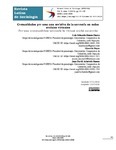Comunidades pro-ana: una revisión de la anorexia en redes sociales virtuales

Use this link to cite
http://hdl.handle.net/2183/27790
Except where otherwise noted, this item's license is described as Atribución-CompartirIgual 4.0 Internacional (CC BY-SA 4.0)
Collections
Metadata
Show full item recordTitle
Comunidades pro-ana: una revisión de la anorexia en redes sociales virtualesAlternative Title(s)
Pro-Ana Communities: Anorexia in Virtual Social NetworksDate
2021-02-14Citation
Ruano Ibarra, L. E., Hoyos, M., & Arboleda Ramos, J. D. (2021). Comunidades pro-ana: una revisión de la anorexia en redes sociales virtuales. Revista Latina de Sociología, 9(2), 91-108. https://doi.org/10.17979/relaso.2019.9.2.6829
Abstract
[Resumen] Se describe el estilo de vida y las lógicas discursivas de personas que hacen parte de comunidades virtuales Pro Ana en las redes sociales de Facebook y WhatsApp. A través de una indagación basada en la etnografía virtual –Netnografía– se recolectaron datos provenientes de la interacción digital de mujeres con rasgos anoréxicos que se congregaban en grupos Pro Ana. Posteriormente, mediante el método cualitativo de teoría fundamentada, se integraron diversas categorías de análisis que permitieron describir el fenómeno de estudio a partir de una perspectiva que expone las evidencias halladas y las contrasta con la producción académica examinada al respecto. Los resultados alcanzados indican la incidencia de aspectos como la cultura, la identidad o las emociones en las representaciones y concepciones fundamentales que convocan a las mujeres a hacer parte de estas comunidades virtuales y que refuerzan prácticas a favor de un estilo de vida pro anorexia. [Abstract] This article examines the lifestyle and discursive logic of members of virtual pro-ana communities on Facebook and WhatsApp. A virtual ethnography (netnography) methodology was used to collect data from the online interactions of women with anorexic tendencies and/or behaviours who meet in pro-ana groups. A qualitative grounded theory method was used to combine the different categories of analysis in order to obtain a description of the phenomenon based on the data from the study and the findings of previous research on the topic. The results show the influence of factors such as culture, identity and emotions on the representations and conceptualisations that prompt women to participate in these virtual communities and reinforce pro-anorexic lifestyle practices.
Keywords
Interacción cultural
Estilo de vida
Minoría cultural
Identidad
Medios sociales
Estilo de vida
Minoría cultural
Identidad
Medios sociales
Editor version
Rights
Atribución-CompartirIgual 4.0 Internacional (CC BY-SA 4.0)
ISSN
2253-6469






